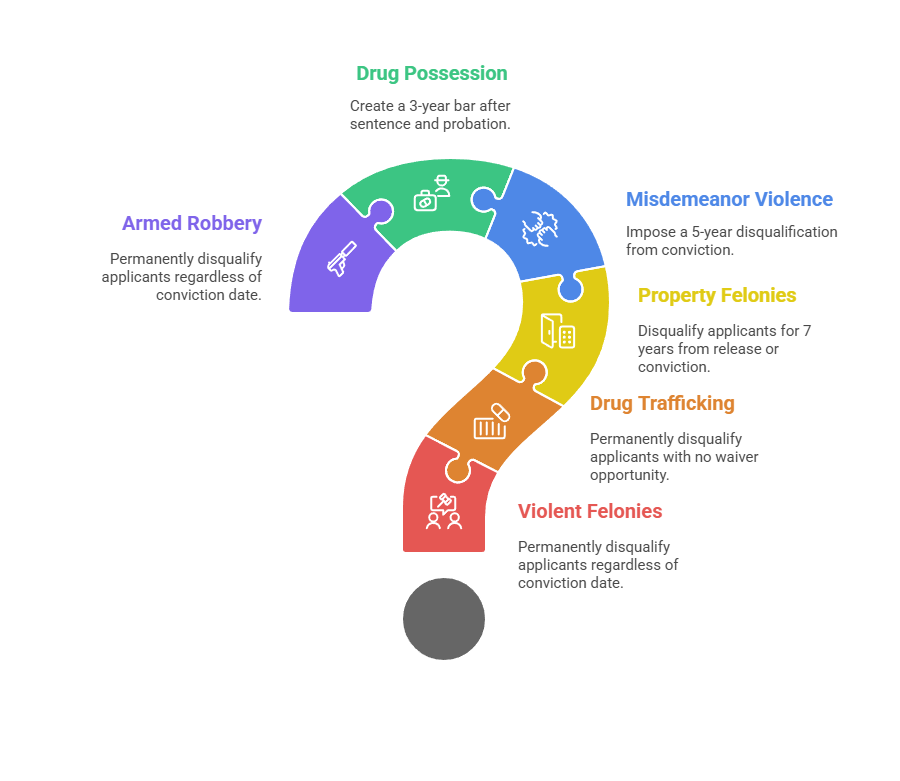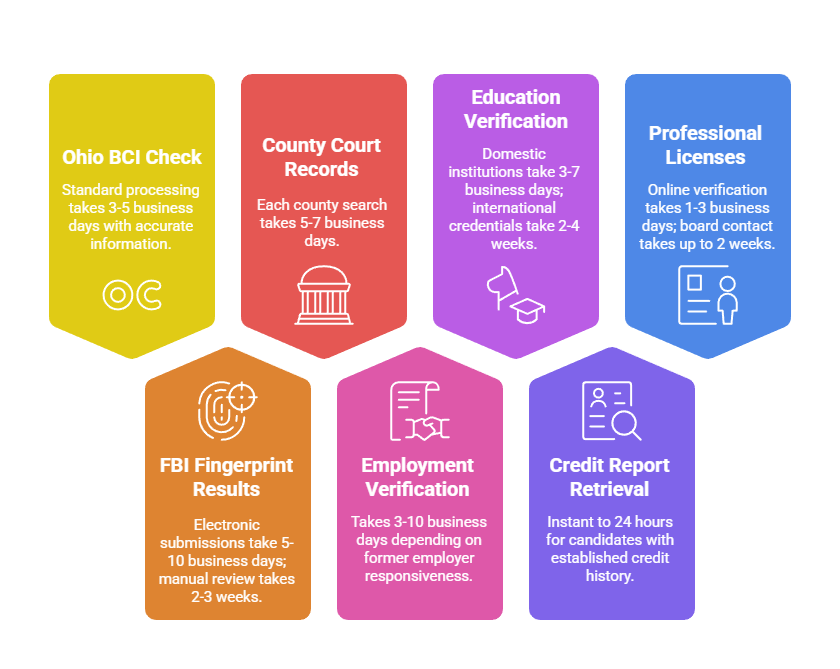Ohio security guard background checks require dual compliance with state STFU (Security Training for Unarmed Forces) licensing standards and employer-specific screening protocols. This creates a layered verification process that protects both licensing status and client risk exposure. Security companies must navigate Ohio Revised Code requirements while implementing enhanced pre-employment screening that addresses individual client security needs and industry best practices.
Key Takeaways
- Ohio requires criminal background checks through BCI and FBI for all security guard STFU license applicants, with automatic disqualification for violent felonies and certain misdemeanors within the past five years.
- Security companies face dual compliance obligations—meeting state minimum licensing standards while satisfying individual client contracts that often demand more comprehensive screening protocols.
- Background check disqualifiers for Ohio security licenses include felony convictions for violence, theft, or drug trafficking, along with recent misdemeanor convictions for assault, domestic violence, or weapons offenses.
- Processing times for Ohio security guard background checks range from 3-5 business days for state criminal records to 2-4 weeks for complete FBI fingerprint results and license approval.
- Most employers implement enhanced screening beyond state requirements, including credit checks, drug testing, employment verification, and education confirmation to meet client specifications.
- Security staffing agencies benefit from streamlined background check processes that accelerate candidate placement while maintaining rigorous compliance with both state regulations and client specifications.
Understanding Ohio Security Guard Licensing Requirements
Ohio's private security industry operates under strict regulatory oversight administered by the Ohio Department of Public Safety. The Security Training for Unarmed Forces (STFU) license serves as the foundational credential for unarmed security guards working throughout the state. This licensing framework establishes minimum background check standards that every security professional must meet before beginning employment.
The state licensing process creates a baseline verification system designed to exclude individuals with disqualifying criminal histories from security positions. However, this government-mandated screening represents only the first layer of verification. Security companies and their clients typically implement additional employment screening measures that extend well beyond state minimums.
State-Mandated Background Check Components
Ohio law requires specific background verification elements for all security guard license applicants. The Ohio Bureau of Criminal Investigation (BCI) conducts state-level criminal history searches. Meanwhile, the Federal Bureau of Investigation (FBI) processes fingerprint-based national criminal records checks. These dual searches create a comprehensive criminal history profile that identifies both in-state and out-of-state offenses.
Applicants must submit fingerprints through approved livescan providers or ink-based fingerprint cards processed through authorized channels. The fingerprint requirement ensures accurate identity verification and prevents applicants from concealing criminal records through name variations or false identification. Background check results remain valid only for the specific license application and cannot be transferred between employers or reused for subsequent applications.
STFU License Application Process
The Security Training for Unarmed Forces license application involves multiple verification steps beyond the criminal background check. Applicants must complete state-approved training programs that cover legal authority, use of force, report writing, and emergency response protocols. Training documentation must accompany the license application along with background check authorization forms and applicable fees.
Processing timelines vary based on background check complexity and application volume. Standard processing typically requires 2-4 weeks from submission to license approval. However, cases involving out-of-state criminal history or name discrepancies may extend beyond this timeframe. Security companies should factor these processing periods into hiring timelines and avoid assigning candidates to security positions before license approval.
Criminal History Disqualifiers for Ohio Security Guards
Ohio law establishes specific criminal offenses that permanently or temporarily disqualify individuals from obtaining security guard licenses. Understanding these disqualifying factors helps security companies make informed hiring decisions and avoid costly licensing denials. The state categorizes disqualifiers based on offense severity, recency, and relevance to security work responsibilities.
Disqualification periods vary significantly depending on conviction type and circumstances. Some offenses create permanent bars to licensure, while others impose time-limited restrictions that expire after specified periods. Security companies must evaluate criminal history in context of both state regulations and their own risk tolerance.
Permanent and Time-Limited Disqualifiers
Certain criminal convictions create barriers to Ohio security guard licensure, with disqualification periods ranging from temporary to permanent based on offense severity. The permanent disqualification category reflects Ohio's determination that certain offenses demonstrate character traits fundamentally incompatible with security work. Understanding these categories helps employers screen candidates effectively before investing in training and application processing.

- Violent Felonies: Murder, voluntary manslaughter, kidnapping, rape, and felonious assault permanently disqualify applicants regardless of how long ago the conviction occurred.
- Drug Trafficking: Felony distribution, manufacturing, and major drug trafficking convictions create lifetime license bars with no opportunity for waiver.
- Property Felonies: Grand theft, burglary, and robbery offenses disqualify candidates for 7 years from release date or conviction, whichever is later.
- Misdemeanor Violence: Assault, domestic violence, menacing, and weapons misdemeanors impose 5-year disqualification periods from conviction date.
- Drug Possession: Misdemeanor drug possession charges create 3-year bars that expire after completion of sentence and probation terms.
- Armed Robbery: Robbery involving weapons or firearms creates permanent disqualification regardless of time elapsed since conviction.
Security companies should implement preliminary criminal screening before investing in training or application processing for candidates who may face permanent licensing barriers. This proactive approach reduces wasted resources and prevents disappointment for candidates unlikely to receive licensure. Some employers use automated prescreening tools that flag disqualifying offenses early in the recruitment process.
Pending Charges and Arrest Records
Ohio licensing authorities may delay license processing when applicants have pending criminal charges, even without convictions. The state typically places applications on hold until charges resolve through conviction, dismissal, or acquittal. This policy prevents licensing individuals who may soon receive disqualifying convictions while protecting applicants who face baseless charges.
Security employers must navigate the complex legal landscape surrounding arrest records and pending charges. Federal and Ohio law generally prohibit employment decisions based solely on arrests without convictions. However, the practical reality of security licensing creates complications. Companies should consult legal counsel when evaluating candidates with pending charges to balance legal compliance, client requirements, and risk management concerns.
Employer-Required Screening Beyond State Minimums
While Ohio's STFU license background check addresses criminal history, most security employers implement comprehensive screening programs that extend far beyond state minimum requirements. These enhanced verification processes respond to client contract specifications, insurance carrier requirements, and industry best practices. Security companies compete for contracts partially based on screening thoroughness, creating market pressure for increasingly rigorous pre-employment verification.
The gap between state licensing requirements and employer screening standards reflects different objectives and risk perspectives. State licensing aims to exclude individuals with disqualifying criminal histories from the entire profession. In contrast, employer screening seeks to identify the most qualified, trustworthy candidates for specific positions while mitigating negligent hiring liability.
Credit and Employment Verification
Many security positions involve access to client facilities, assets, or sensitive information that create theft or fraud opportunities. Credit history checks help employers assess financial responsibility and identify candidates facing severe financial stress that might increase theft risk. Additionally, security companies serving financial institutions, retail clients, or high-value facilities frequently mandate credit screening as a non-negotiable hiring requirement.
Thorough employment verification confirms candidate work history accuracy and reveals performance issues, policy violations, or termination circumstances that might not appear in criminal records. Security companies typically verify all positions held within the past 7-10 years, contacting former employers directly rather than accepting candidate-provided documentation alone. This verification uncovers resume fraud, undisclosed terminations, and patterns of job-hopping that may indicate performance or reliability concerns.
| Verification Component | Information Obtained | Typical Lookback Period |
| Criminal Records | Convictions, pending charges, incarceration | Lifetime (felonies), 7 years (misdemeanors) |
| Credit History | Payment history, bankruptcies, collections | 7-10 years |
| Employment History | Start/end dates, position titles, rehire eligibility | 7-10 years |
| Education | Degree/diploma verification, attendance dates | All claimed credentials |
| Motor Vehicle Records | Violations, suspensions, DUI history | 3-5 years |
Credit checks for employment purposes operate under Fair Credit Reporting Act (FCRA) regulations that require specific disclosures, candidate authorization, and adverse action procedures when credit information influences hiring decisions. Employers must provide standalone authorization forms separate from general employment applications.
Education and Credential Verification
Security positions increasingly require specific educational qualifications or professional certifications, particularly for supervisory, investigative, or technical security roles. Education verification confirms claimed degrees, diplomas, and certifications through direct contact with issuing institutions. This screening identifies diploma mill credentials, fabricated degrees, and exaggerated educational qualifications that candidates frequently misrepresent on applications.
Credential verification extends beyond academic degrees to professional certifications relevant to security work. CPR/First Aid certifications, emergency response training, specialized security certifications, and technical credentials all require verification. Many certifications have expiration dates, continuing education requirements, or disciplinary processes that affect credential validity. Employers should verify not just that candidates once held credentials but that certifications remain current and in good standing.
Drug Testing and Health Screening Requirements
Substance abuse poses significant risks in security operations where employees carry weapons, operate vehicles, control access to secure areas, or respond to emergencies. Most Ohio security employers implement drug screening as a standard pre-employment requirement. Furthermore, many clients mandate ongoing random testing throughout employment. Drug testing programs must comply with Ohio law, industry regulations, and client specifications while respecting candidate privacy rights.
The legal landscape surrounding employment drug testing continues evolving, particularly regarding marijuana use in states with medical cannabis programs. Ohio's medical marijuana law prohibits employers from discriminating against cardholders but includes exceptions for positions affecting public safety. Security companies must navigate these complexities carefully, consulting legal counsel to develop compliant drug testing policies.
Pre-Employment and Ongoing Testing
Initial drug testing typically occurs after conditional employment offers but before job start dates. This timing protects employers from disability discrimination claims while ensuring candidates meet substance abuse standards before beginning work. Standard drug panels test for marijuana, cocaine, amphetamines, opiates, and PCP. However, employers may expand testing to include additional substances based on position requirements or client specifications.
Many security contracts require random drug testing programs that continue throughout employment. Random testing programs select employees for screening using truly random selection methods that give each employee equal probability of selection during each testing period. The unpredictability of random testing creates a deterrent effect that discourages substance abuse between scheduled tests. Post-incident drug testing occurs following workplace accidents, policy violations, or incidents suggesting impairment.
Physical Fitness and Medical Standards
Certain security positions involve physical demands that require medical screening to ensure candidates can safely perform essential job functions. Security guards who patrol large facilities, respond to emergencies, or work in challenging environments may need medical examinations verifying cardiovascular fitness, mobility, and absence of conditions that might create sudden incapacitation risks. These examinations must comply with Americans with Disabilities Act requirements that limit pre-offer medical inquiries.
Physical fitness testing measures specific capabilities like lifting capacity, sustained walking or standing ability, stair climbing, and quick response capacity. Tests must directly relate to actual job requirements with clear business necessity justification. Employers cannot impose blanket fitness requirements unrelated to specific position demands. When candidates cannot meet physical requirements due to disabilities, employers must engage in the interactive accommodation process.
Background Check Processing and Turnaround Times

Security companies face pressure to fill positions quickly while maintaining thorough screening standards. Understanding background check processing timelines helps employers manage hiring workflows, set realistic expectations with candidates, and avoid premature job assignments. Processing times vary significantly based on check complexity, jurisdiction cooperation, and information availability.
Accelerated hiring needs must be balanced against the impossibility of truly instant comprehensive background checks. Companies promising immediate results typically provide only partial information from limited databases. Therefore, security employers should resist pressure to compromise screening thoroughness in favor of speed.
Standard Processing Timelines
Different background check components require varying processing periods that affect overall turnaround time. Ohio BCI criminal history reports typically return within 3-5 business days when submissions follow proper procedures and applicant information matches records accurately. FBI fingerprint-based checks generally process within 5-10 business days, though some submissions require manual review that extends timelines to 2-3 weeks. County courthouse criminal record searches take longer than database checks because they require physical or electronic review of actual court records.

- Ohio BCI criminal check: 3-5 business days for standard processing with accurate information
- FBI fingerprint results: 5-10 business days for electronic submissions; 2-3 weeks for manual review
- County court records: 5-7 business days per county searched
- Employment verification: 3-10 business days depending on former employer responsiveness
- Education verification: 3-7 business days for domestic institutions; 2-4 weeks for international credentials
- Credit report retrieval: Instant to 24 hours for candidates with established credit history
- Professional licenses: 1-3 business days for online verification; up to 2 weeks for board contact
Security companies should build these timelines into hiring processes and communicate realistic expectations to candidates. Strategic scheduling of background check initiation during the interview process can reduce time-to-hire without compromising screening thoroughness. Rush processing options exist for some verification types but typically involve additional fees and still cannot eliminate inherent processing requirements.
Managing Incomplete or Delayed Results
Background checks occasionally produce incomplete results due to unresponsive former employers, court records accessibility issues, or information verification difficulties. Employers must decide whether to proceed with hiring based on partial information or delay employment until complete results arrive. This decision should weigh position sensitivity, available information, and specific missing data relevance.
When delays threaten business operations, some employers implement conditional start dates where new hires complete non-sensitive training or orientation activities while final background checks complete. This approach requires clear communication that employment remains contingent on satisfactory background check results and immediate termination provisions if disqualifying information emerges. Conditional employment arrangements carry risks if employees begin actual security work before complete screening finishes, potentially voiding insurance coverage or creating licensing violations.
Compliance Challenges for Security Staffing Agencies
Security staffing agencies face unique background check compliance challenges distinct from those affecting direct-hire security companies. Agencies must maintain screening standards that satisfy multiple client companies with varying requirements. At the same time, they must ensure state licensing compliance across their entire candidate pool. This multi-stakeholder accountability creates complexity in policy development and quality assurance processes.
The staffing model creates additional layers of liability exposure since agencies share responsibility for employee conduct with client companies. Negligent hiring claims may target staffing agencies even when incidents occur at client facilities under client supervision. This shared liability structure incentivizes thorough screening that exceeds minimum requirements and addresses foreseeable risks.
Client-Specific Screening Requirements
Security clients often impose screening requirements beyond state minimums, varying by industry, facility type, and risk profile. Healthcare facilities may require abuse registry checks and enhanced background screening for positions involving patient contact. Financial institutions typically mandate credit checks and continuous monitoring programs. Government contractors must comply with federal screening standards that often exceed state requirements.
Staffing agencies must track client-specific requirements systematically and ensure assigned candidates meet all applicable standards. This tracking creates administrative complexity, particularly when candidates work for multiple clients sequentially or simultaneously. Database systems that flag candidate screening components and match them against client requirements help agencies maintain compliance.
Balancing Speed and Thoroughness
Staffing agencies face intense pressure to fill client openings quickly, sometimes within 24-48 hours of request receipt. This urgency creates tension with comprehensive background screening requirements that may take 2-3 weeks to complete fully. Agencies must resist client pressure to compromise screening quality while developing processes that maximize efficiency without sacrificing thoroughness.
Strategic candidate pool management helps agencies balance these competing demands. Maintaining a pre-screened candidate pool with completed background checks enables rapid placement when client needs arise. This proactive approach requires ongoing candidate pipeline development and periodic re-screening to ensure background check information remains current. Technology solutions streamline background check processes without compromising quality.
Understanding FCRA Compliance for Background Checks
The Fair Credit Reporting Act governs employment background checks conducted through third-party consumer reporting agencies. It imposes specific disclosure, authorization, and adverse action requirements. Security companies must comply with FCRA mandates to avoid statutory damages, actual damages, attorney fees, and potential class action litigation. Compliance failures create significant financial exposure, with penalties ranging from $100-$1,000 per violation plus actual damages.
FCRA compliance extends beyond initial background check authorization to encompass information storage, update obligations, adverse action procedures, and candidate dispute rights. Security employers should implement comprehensive FCRA compliance programs that address all regulatory touchpoints. Legal counsel review of background check policies, forms, and procedures helps identify compliance gaps before they create enforcement exposure.
Required Disclosures and Authorizations
FCRA requires employers to provide clear, conspicuous written disclosure that background checks will be conducted for employment purposes. The disclosure must appear in a standalone document separate from employment applications or other forms. Employers cannot include liability waivers, release language, or extraneous information in the disclosure document beyond specific, limited exceptions.
After providing proper disclosure, employers must obtain written authorization from candidates before ordering background checks. The authorization may appear in the same document as the disclosure or as a separate form. Authorization forms should clearly explain the scope of background checks to be conducted, including specific information types such as criminal records, credit history, employment verification, and education verification.
Adverse Action Procedures
When background check information contributes to an adverse employment decision, FCRA mandates a two-step adverse action process. First, employers must provide pre-adverse action notice including a copy of the consumer report and the FTC's Summary of Rights Under FCRA. This notice gives candidates an opportunity to identify errors or provide explanations before final decisions are made.
After providing pre-adverse action notice, employers must allow a "reasonable period" for candidate response. While FCRA doesn't specify exact timeframes, FTC guidance suggests 5 business days represents a reasonable period in most circumstances. Following the reasonable period, employers who proceed with adverse decisions must provide final adverse action notices. These notices must identify the consumer reporting agency that provided the report and inform candidates of their right to dispute report accuracy.
| Requirement | Timing | Key Elements |
| Written Disclosure | Before background check | Standalone document stating consumer report may be obtained |
| Written Authorization | Before background check | Candidate signature permitting background check |
| Pre-Adverse Action Notice | Before denying employment | Copy of consumer report and Summary of Rights |
| Reasonable Period | After pre-adverse action | Typically 5 business days for candidate dispute |
| Final Adverse Action Notice | After reasonable period | Final decision notice with reporting agency contact information |
FCRA requires employers to protect background check information from unauthorized access and dispose of it securely when no longer needed. Acceptable disposal methods include burning, pulverizing, or shredding paper documents, and destroying or erasing electronic files to make information unreadable.
Cost Considerations and Service Provider Selection
Background check costs vary significantly based on screening scope, search depth, and service provider pricing models. Security companies must balance thoroughness against budget constraints while recognizing that comprehensive screening represents insurance against far costlier negligent hiring liability. Understanding pricing structures, included services, and quality indicators helps employers select background check providers that deliver value rather than simply lowest cost.
Service provider selection should prioritize accuracy, compliance support, customer service responsiveness, and technology platform capabilities alongside pricing. Inaccurate background checks create adverse action complications, potential discrimination claims, and hiring delays. Security companies should evaluate providers based on total value delivery rather than per-check pricing alone.
Typical Background Check Pricing
Basic criminal record searches typically cost $20-40 per candidate, covering state repository checks and county court record searches in candidate-listed locations. Comprehensive packages including employment verification, education verification, credit checks, and motor vehicle records range from $75-150 per candidate. Enhanced screening for high-security positions with extensive employment verification and multi-state criminal searches may cost $200-300 or more per candidate.
Volume discounts significantly impact per-check costs for security companies with regular hiring needs. Providers typically offer tiered pricing where per-check costs decrease as monthly volume increases. Annual contracts with minimum volume commitments often secure the lowest pricing. Security staffing agencies with consistent volume benefit most from contract pricing, while smaller companies with sporadic hiring may prefer pay-as-you-go models.
Evaluating Service Provider Quality
Background check accuracy depends on data source quality, search methodology, and quality control processes. Employers should verify that providers access primary source records rather than relying exclusively on compiled databases that may contain outdated or incomplete information. County courthouse searches, direct employer contact for verification, and institution-direct education confirmation produce more reliable results than database-only searches.
- Data accuracy: Confirm providers access courthouse records and directly contact former employers rather than relying solely on compiled databases
- FCRA compliance support: Evaluate included compliance tools such as compliant authorization forms and automated adverse action workflows
- Turnaround time consistency: Assess whether providers meet promised timelines reliably and communicate delays proactively
- Customer service responsiveness: Test provider communication channels and response times for screening questions and issue resolution
- Technology platform: Review applicant tracking system integrations, mobile accessibility, and real-time status tracking capabilities
- Industry experience: Prioritize providers familiar with security industry requirements and Ohio licensing standards
- Continuous monitoring: Determine availability of ongoing criminal record monitoring and periodic re-screening services
Security companies should request provider references from similar-sized companies in the security industry operating in comparable markets. Trial periods or small-volume initial engagements allow first-hand provider evaluation before committing to long-term contracts. Reference conversations should explore accuracy satisfaction, turnaround time reliability, and problem resolution effectiveness.
Conclusion
Ohio security guard background checks require navigating complex intersections between state licensing requirements, FCRA compliance mandates, and client-specific screening expectations. Security companies must implement comprehensive verification programs that satisfy regulatory minimums while addressing liability concerns and contractual obligations. The investment in thorough pre-employment screening protects licensing status and provides defense against negligent hiring claims. By partnering with quality background check providers and maintaining rigorous compliance protocols, security employers can build trustworthy workforces that meet the highest industry standards.
Frequently Asked Questions
What disqualifies you from getting a security license in Ohio?
Violent felonies including murder, rape, kidnapping, and felonious assault create permanent disqualification from Ohio security licenses. Drug trafficking felonies, armed robbery, and weapons offenses also permanently bar licensure. Time-limited disqualifiers include property felonies (7 years from release), misdemeanor assault and domestic violence (5 years), and drug possession misdemeanors (3 years). Pending criminal charges may delay license processing until charges resolve.
How long does an Ohio security guard background check take?
Ohio BCI criminal checks typically process within 3-5 business days, while FBI fingerprint checks take 5-10 business days. Complete background checks including employment verification and credit reports generally require 2-3 weeks total. County courthouse searches add 5-7 business days per jurisdiction. Employers should factor these timelines into hiring schedules and avoid assigning candidates before license approval.
Do Ohio security guards need FBI background checks?
Yes, all Ohio security guard license applicants must complete FBI fingerprint-based national criminal history checks in addition to state BCI searches. This dual requirement ensures comprehensive verification covering both in-state and out-of-state offenses. Applicants submit fingerprints through approved livescan providers or authorized fingerprint card channels. The FBI check identifies criminal records from jurisdictions outside Ohio that state-level searches would miss.
What shows up on a security guard background check in Ohio?
Security guard background checks include state and federal criminal records showing felony and misdemeanor convictions, pending charges, and incarceration history. Employers typically add employment verification, education confirmation, credit reports, motor vehicle records, and drug screening beyond state-required criminal checks. The scope depends on employer policies and client requirements, with high-security positions often requiring enhanced screening and continuous monitoring.
Can you work security in Ohio with a misdemeanor?
Many misdemeanors do not permanently disqualify Ohio security license applicants, though time restrictions apply to specific offenses. Misdemeanor assault, domestic violence, and weapons offenses create 5-year disqualification periods from conviction date. Drug possession misdemeanors impose 3-year bars. Misdemeanors unrelated to violence, theft, drugs, or dishonesty generally don't prevent licensure, though employers may impose stricter standards than state minimums.
How much do background checks cost for security companies?
Basic criminal record checks cost $20-40 per candidate covering state repository and county courthouse searches. Comprehensive packages including employment verification, education confirmation, credit reports, and drug screening range from $75-150 per candidate. Enhanced screening for high-security positions costs $200-300 or more. Volume discounts reduce per-check costs significantly for companies with regular hiring needs.
What is Ohio's STFU license for security guards?
Ohio's Security Training for Unarmed Forces (STFU) license is the state-required credential for unarmed security guards. The license requires completing state-approved training covering legal authority, use of force, report writing, and emergency response, along with passing BCI and FBI background checks. STFU licenses verify that security professionals meet minimum state standards for criminal history, training, and competency.
Do security companies perform continuous background monitoring?
Many security companies implement continuous criminal record monitoring that alerts them to new arrests, charges, or convictions affecting active employees. This ongoing screening identifies disqualifying incidents occurring after initial employment and protects companies from liability. Monitoring frequency varies by employer and client requirements, with some contracts requiring annual or semi-annual re-screening including updated criminal checks, license verification, and drug testing.
Additional Resources
- Ohio Department of Public Safety - Private Security Licensing
https://publicsafety.ohio.gov/division-of-homeland-security/private-security - Federal Trade Commission - Background Checks: What Employers Need to Know
https://www.ftc.gov/business-guidance/resources/background-checks-what-employers-need-know - Fair Credit Reporting Act (FCRA) - Full Text
https://www.ftc.gov/legal-library/browse/statutes/fair-credit-reporting-act - Ohio Revised Code Chapter 4749 - Private Investigators and Security Guards
https://codes.ohio.gov/ohio-revised-code/chapter-4749 - ASIS International - Background Screening Guidelines
https://www.asisonline.org/publications--resources/standards-guidelines/

GCheck Editorial Team
Meet the GCheck Editorial Team, your trusted source for insightful and up-to-date information in the world of employment background checks. Committed to delivering the latest trends, best practices, and industry insights, our team is dedicated to keeping you informed.
With a passion for ensuring accuracy, compliance, and efficiency in background screening, we are your go-to experts in the field. Stay tuned for our comprehensive articles, guides, and analysis, designed to empower businesses and individuals with the knowledge they need to make informed decisions.
At GCheck, we're here to guide you through the complexities of background checks, every step of the way.





